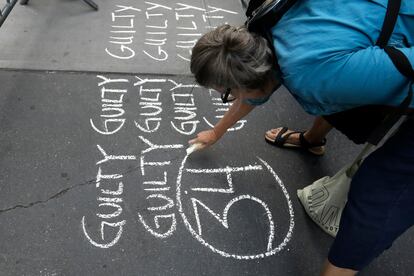Trump could go to jail... and still be president
The U.S. Constitution does not prevent a person convicted in a criminal trial from running for office or from reaching the White House


On July 11, Judge Juan Merchan will read the sentence he plans to give Donald Trump after the former president was found guilty of 34 counts of falsifying business records by a New York jury Thursday in a case stemming from hush money paid to the porn actress Stormy Daniels during the final stage of the 2016 election that brought Trump to the White House. In another concatenation of unprecedented events in U.S. history, four days later, on July 15, the Republican National Convention will begin in Milwaukee at which Trump will almost certainly be officially named the conservative party’s candidate for the November 5 presidential election.
Never before has a former U.S. president faced a criminal case, much less four, nor been convicted, so far just in the first of them. Nor has a presidential hopeful ever faced such a predicament: a verdict that could land him in jail (he faces a maximum of four years), although that is unlikely to happen. Of the many questions that have arisen in the wake of the landmark verdict, which Trump can appeal, one stands out: will the sentence in any way hinder Trump’s aspirations to return to the White House for a second term?
The short answer is no. Unless negative news about his legal troubles influences voter sentiment (and, according to the latest polls, that seems unlikely), not only does the U.S. Constitution not prevent Trump from running for office; it also does not prohibit a person convicted by the federal justice system from becoming president, even if they end up in jail, unless they are in prison for a very specific crime: insurrection. And that has been ruled out: in the four open cases against him, the former president faces 91 charges, but none of them is for insurrection. However, it could be debated whether his role in the assault on the Capitol on January 6, 2021 fits that definition.

Trump is also shielded by a recent ruling by the Supreme Court, which ruled against the effort of some states, with Colorado in the lead, to remove him from the ballots based on the Third Section of the 14th Amendment of the Constitution. This is an addendum approved in 1868, three years after the end of the Civil War (1861-1865). It served to grant full rights to enslaved people and to introduce a rule that would prevent the Confederate rebels from being able to hold public office again, and destroying the system from within.
If Trump is sentenced to prison — which many experts see as unlikely given he has no criminal record — this could have consequences in states that prohibit people convicted of a criminal offense from voting. This is not the case in Florida, where the tycoon resides in Mar-a-Lago, his mansion in Palm Beach. A felony conviction in another state makes a person ineligible to vote in Florida only if the conviction would make the person ineligible to vote in the state where the person was convicted. Trump was convicted in New York, which does not deprive prisoners of their electoral rights.
Secret Service agents behind bars?
Another unsuspected consequence of Trump being sent to prison is that members of the Secret Service designated for his protection would have to join him there. U.S. law requires them to protect the former president 24 hours a day, seven days a week, regardless of where he is.
To find any precedent for what happened on Thursday with Trump and how it will impact his bid for the White House, one must go back more than a century, to the obscure case of a candidate named Eugene Debs. He campaigned from prison in 1920, as leader of the Socialist Party of America, while serving a sentence for violating the Espionage Act of 1917. He was convicted for making speeches critical of the United States’ role in World War I. He did not make it to the White House; Republican Warren Harding won the election overwhelmingly. And those numbers invalidate the power for precedent of the case: unlike Trump, who leads in a good handful of polls over U.S. President Joe Biden, who is running for re-election, Debs never had any chance of winning.
Sign up for our weekly newsletter to get more English-language news coverage from EL PAÍS USA Edition
Tu suscripción se está usando en otro dispositivo
¿Quieres añadir otro usuario a tu suscripción?
Si continúas leyendo en este dispositivo, no se podrá leer en el otro.
FlechaTu suscripción se está usando en otro dispositivo y solo puedes acceder a EL PAÍS desde un dispositivo a la vez.
Si quieres compartir tu cuenta, cambia tu suscripción a la modalidad Premium, así podrás añadir otro usuario. Cada uno accederá con su propia cuenta de email, lo que os permitirá personalizar vuestra experiencia en EL PAÍS.
¿Tienes una suscripción de empresa? Accede aquí para contratar más cuentas.
En el caso de no saber quién está usando tu cuenta, te recomendamos cambiar tu contraseña aquí.
Si decides continuar compartiendo tu cuenta, este mensaje se mostrará en tu dispositivo y en el de la otra persona que está usando tu cuenta de forma indefinida, afectando a tu experiencia de lectura. Puedes consultar aquí los términos y condiciones de la suscripción digital.








































